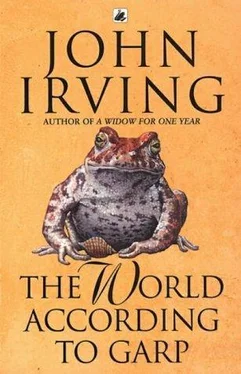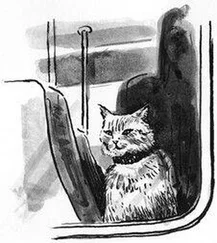“I'll do the dishes alone,” Garp offered, clearing the way to his story for her. Her heart sank; she had read too much. Sex, or at least romance, was the subject she had at last come to; Garp had better provide it or Michael Milton would.
“I want to be loved,” Helen told Garp; he was gathering up the dishes like a waiter who was confident of a large tip. He laughed at her.
“Read the story, Helen,” he said. “ Then we'll get laid.”
She resented his priorities. There could be no comparison between Garp's writing and the student work of Michael Milton; though gifted among students, Michael Milton, Helen knew, would only be a student of writing all his life. The issue was not writing. The issue is me , Helen thought; I want someone paying attention to me. Garp's manner of courtship was suddenly offensive to her. The subject being courted was somehow Garp's writing. That is not the subject between us, Helen thought. Because of Michael Milton, Helen was way ahead of Garp at considering the spoken and unspoken subjects between people. “If people only told each other what was on their minds,” wrote Jenny Fields—a naпve but forgivable lapse; both Garp and Jenny knew how difficult it was for people to do that.
Garp cautiously washed the dishes, waiting for Helen to read his story. Instinctively—the trained teacher—Helen took out her red pencil and began. That is not how she should read my story, Garp thought; I'm not one of her students. But he went on quietly washing the dishes. He saw there was no stopping her.
Vigilance
by T. S. Garp
Running my five miles a day, I frequently encounter some smart-mouthed motorist who will pull alongside me and ask (from the safety of the driver's seat), “What are you in training for?”
Deep and regular breathing is the secret; I am rarely out of breath; I never pant or gasp when I respond. “I am staying in shape to chase cars,” I say.
At this point the responses of the motorists vary; there are degrees of stupidity as there are degrees of everything else. Of course, they never realize that I don't mean them—I'm not staying in shape to chose their cars; not out on the open road, at least. I let them go out there, though I sometimes believe that I could catch them. And I do not run on the open road, as some motorists believe, to attract attention.
In my neighborhood there is no place to run. One must leave the suburbs to be even a middle-distance runner. Where I live there are four-way stop signs at every intersection; the blocks are short, and those tight-angle corners are hard on the balls of the feet. Also, the sidewalks are threatened by dogs, festooned with the playthings of children, intermittently splashed with lawn sprinklers. And just when there's some running room, there's an elderly person taking up the whole sidewalk, precarious on crutches or armed with quacking cones. With good conscience one does not yell “Track!” to such a person. Even passing the aged at a safe distance, but with my usual speed, seems to alarm them; and it's not my intention to cause heart attacks.
So it's the open road for training, but it's the suburbs I'm in training for . In my condition I am more than a match for a car caught speeding in my neighborhood. Provided they make an even half-hearted halt at the stop signs, they cannot hit over fifty before they have to brake for the next intersection. I always catch up to them. I can travel across lawns, over porches, through swing sets and the children's wading pools; I can burst through hedges, or hurdle them. And since my engine is quiet—and steady, and always in tune—I can hear if other cars are coming; I don't have to stop at the stop signs.
In the end I run them down, I wave them over; they always stop. Although I am clearly in impressive car-chasing condition, that is not what intimidates the speeders. No, they are almost always intimidated by my parenthood , because they are almost always young. Yes, my parenthood is what sobers them, almost every time. I begin simply. “Did you see my children back there?” I ask them, loudly and anxiously. Veteran speeders, upon being asked such a question, are immediately frightened that they have run over my children. They are instantly defensive.
“I have two young children,” I tell them. The drama is deliberate in my voice—which, with this sentence, I allow to tremble a little. It is as if I am holding back tears, or unspeakable rage, or both. Perhaps they think I am hunting a kidnapper, or that I suspect them of being child molesters.
“What happened?” they invariably ask.
“You didn't see my children, did you?” I repeat. “A little boy pulling a little girl in a red wagon?” This is, of course, a fiction. I have two boys, and they're not so little; they have no wagon. They may have been watching television at the time, or riding their bikes in the park—where it's safe, where there are no cars.
“No,” the bewildered speeder says. “I saw children, some children. But I don't think I saw those children. Why ?”
“Because you almost killed them,” I say.
“But I didn't see them!” the speeder protests.
“You were driving too fast to see them!” I, say. This is sprung on them as if it were proof of their guilt; I always pronounce this sentence as if it were hard evidence. And they're never sure. I've rehearsed this part so well. The sweat from my hard sprint, by now, drips off my mustache and the point of my chin, streaking the driver's-side door. They know only a father who genuinely fears for his children would run so hard, would stare like such a maniac, would wear such a cruel mustache.
“I'm sorry,” they usually say.
“This is a neighborhood full of children,” I always tell them. “You have other places you can drive fast, don't you? Please, for the children's sake, don't speed here anymore.” My voice, now, is never nasty; it is always beseeching. But they see that a restrained fanatic resides behind my honest, watering eyes.
Usually it's just a young kid. Those kids have a need to dribble a little oil; they want to race the frantic pace of the music on their radios. And I don't expect to change their ways. I only hope they'll do it somewhere else. I concede that the open road is theirs; when I train there, I keep my place. I run in the stuff of the soft shoulder, in the hot sand and gravel, in the beer-bottle glass—among the mangled cats, the maimed birds, the mashed condoms. But in my neighborhood, the car is not king; not yet.
Usually they learn.
After my five-mile run I do fifty-five push-ups, then five hundred-yard dashes, followed by fifty-five situps, followed by fifty-five neck bridges. It's not that I care so much for the number five; it's simply that strenuous and mindless exertion is easier if one doesn't have to keep track of too many different numbers. After my shower (about five o'clock), through the late afternoon, and in the course of the evening, I allow myself five beers.
I do not chase cars at night. Children should not be playing outside at night—in my neighborhood, or in any other neighborhood. At night, I believe, the car is king of the whole modern world. Even the suburbs.
At night, in fact, I rarely leave my house, or allow the members of my family to venture out. But once I went to investigate an obvious accident—the darkness suddenly streaked with headlights pointing straight up and exploding; the silence pierced with a metal screaming and the shriek of ground glass. Only half a block away, in the dark and perfect middle of my street, a Land Rover lay upsidedown and bleeding its oil and gas in a puddle so deep and still I could see the moon in it. The only sound: the ping of heat in the hot pipes and the dead engine. The Land Rover looked like a tank tumbled by a land mine. Great juts and tears in the pavement revealed that the auto had rolled over and over before coming to rest here.
Читать дальше












